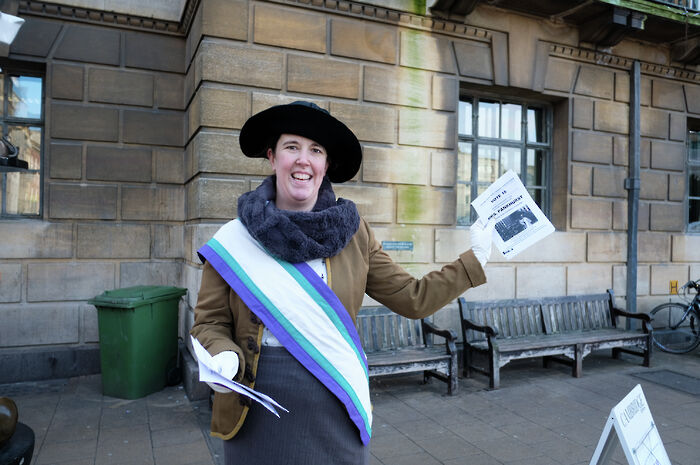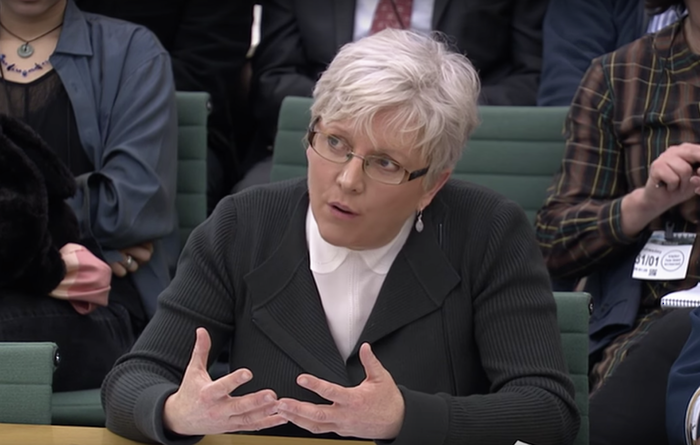Cambridge celebrates International Women’s Day
Students gathered to read poetry and essays, and make banners for the annual Reclaim the Night march

Cambridge’s celebrations of the 2018 International Women’s Day took many forms, ranging from formals and social events to discussion groups and speeches. The day’s importance, according to Churchill’s women’s officer, lies in recognising “how much feminism has achieved, but also how much more work has to be done,” with an aim to “raise awareness of the extent of oppression women still face, particularly LGBT+ and BME women, and women living with disability.”
CUSU Women’s Campaign organised an afternoon of events honouring the Women’s Strike – an international movement encouraging women to reject the unpaid work society expects them to perform – and in solidarity with women and non-binary workers currently taking part in the on-going UCU industrial action.
A series of teach-outs took place, focused on the history of working class women and non-binary people’s roles in activism. After these teach-outs, many women and non-binary people of colour gave readings of poetry and essays, featuring work from writers such as Audre Lorde and Ijeoma Umebinyuo, as well as new, often deeply personal, writing. Themes ranged from the influence of colonialism on identity to the often gendered nature of care and welfare, and CUSU presidential candidate, Siyang Wei, discussed lesbian feminism.
Following the readings, women and non-binary people united to create banners for the Reclaim the Night march, set to take place this Sunday, and to write letters to those currently imprisoned in Yarl’s Wood immigration detention centre.
One woman, who chose to remain anonymous, described the event’s environment as “welcoming”, noting that nowhere else had she ever felt confident enough to speak in front of an audience.
A symposium took place on Wednesday evening to explore the 2018 International Women’s Day campaign theme #PressforProgress, asking what work remains necessary in the fight for gender parity. Two of the speakers – Professor Nicola Padfield, master of Fitzwilliam College, and Dr Ann Olivarius – drew upon their extensive legal experience, while CUSU women’s officer Lola Olufemi had an activist’s perspective on the matters.
Sophia Borgeest – organiser of the event and Pembroke College graduate women’s officer – said that in choosing the speakers she had sought a “diverse” group of people, but noted that “what the three women have in common is that they spend a significant chunk of their professional and personal lives thinking about and fighting against injustice”.
Issues discussed ranged from all-female sports teams to the culture of sexual abuse within many of our universities, in an environment of debate that, according to Padfield, “was good at pricking all our consciences and allowing us to ask some difficult questions”.
Speaking to Varsity following the symposium, Padfield celebrated International Women’s Day as a “vital” opportunity to “keep the subject of inequality firmly on everyone’s agenda.
“Women’s rights have advanced a long way for some women in the last 100 years, but what has been gained can so easily be lost. And we must never forget that the advances have been deeply patchy.”
Asked about being a feminist, Padfield said “I don’t see how I could not be.” She noted that feminism’s main difficulty, from her perspective, lies in “moving from rhetoric to practice,” which requires us to be active in questioning both ourselves and the people around us.
While speaking at the symposium, Lola Olufemi detailed the work she has done for female and non-binary empowerment over the past year in her role as CUSU women’s officer, and noted the progress that must still be made. She emphasised a belief that women’s advancement is “a collective task”, which must be undertaken by all people, for all people, arguing that we must “decolonise” our feminist viewpoints and ensure that our movement is intersectional.
Padfield, too, advocated for intersectional feminism, though she cautioned that she is “no expert,” saying “I am simply a lawyer who thinks we should all encourage each other to be a bit braver in standing up for those who are disadvantaged”.
Many individual colleges also hosted their own celebrations. At Robinson, an event on Thursday afternoon promised the opportunity to “celebrate the women in your life” in a “safe space”. During the course of the afternoon, banners and posters for the Reclaim the Night march were designed, and several speeches were given, including one on eco-feminism. The event proved popular, with one attendee noting that the JCR was “the most packed” she’d ever seen it.
Speaking to Varsity, Jess Henderson – Robinson’s JCR Women’s Officer – described this International Women’s Day celebration as “both a political and a welfare event”.
Henderson emphasised that because “the feminist events in Cambridge tend to attract the same groups of people” she has worked particularly hard to bring “openness” to Robinson’s event, saying that she “really tried to promote the event to all years and to students from all subjects and backgrounds”.
Asked about the continued importance of International Women’s Day, Henderson described the celebration as “an opportunity for everyone to reflect on the history of women’s struggles across the globe as well as a chance to re-energise current women’s movements for equality and liberation”.
Meanwhile, at Churchill College, a forum and social specifically aimed at women and non-binary people, provided – according to Nikki Eames, the college’s women’s officer – “a space for women to express their grievances” in the “statistically male-dominated college.”
Several other colleges marked the day with formals. Jesus College women’s officer, Holly Scott, said that the International Women’s Day formal at her college presented “a chance for us to celebrate the achievements of women and non-binary people”.
Similarly, Isobel Griffiths, Christ’s College charities officer, described the Christ’s formal as “a time for people to get together to celebrate” as well as “a time to reflect and think about the injustices women still face”. Money raised at this event will support charities chosen by Christ’s JCR, including the Cambridge Rape Crisis Centre (CRCC) and SOLFA – both of which specifically aim to tackle issues of gender inequality.
Sophia Borgeest, Pembroke College’s graduate women’s officer, revealed that requests to have an International Women’s Day dinner reserved exclusively for those identifying as female and non-binary were denied on the grounds that it was deemed unacceptable to “exclude men”.
Speaking to Varsity, Borgeest noted that Pembroke does in fact frequently host dinners for specific groups of people, citing Boat Club dinners as an example. Although the college’s response to the request was negative, among students and staff alike there has been support, with “several female fellows” inviting women and non-binary graduate students to a drinks reception prior to the meal. Furthermore, “a male member of the MCR committee emailed a petition to all graduates, asking men to sign it in support of having a women-only dinner.”
Speaking of the usefulness of women-only safe spaces, Borgeest said, “Men have dominated places like Cambridge for centuries. Even today, their portraits decorate our halls, their names occupy our street signs, buildings and the prizes we award to each other. Having women’s only spaces, I think, can do two things: first, it can make men aware of the history of dominance and of the privilege they inherit from it. Second, there is something incredible about women getting together, something empowering.”
Gendered struggles are, according to one female student at the symposium, “innately political”, which was recognised at the Cambridge University Labour Club’s (CULC) International Women’s Day social. This event provided people of all genders with the opportunity to talk about the continued gender inequality within our society and the responsibility we all share to strive to overcome it.
Speakers at this event included Rachel Megan Barker, former LGBT+ Officer for London Young Labour, Rania Ramli, BAME Officer for Labour Students, and Elspeth Oakley, a proudly disabled and queer feminist, who has previously stood for Young Labour Women’s Officer.
The speakers and attendees discussed, among other things, the disproportionate amount of abuse faced by female MPs and how this restricts women’s access to politics, with speakers detailing their own unique backstories and noting that though political involvement can be “empowering”, it is also often “mentally exhausting.”
Speaking to Varsity following the event, Elspeth Oakley said “it is so important that we platform women’s voices. All too often, men don’t realise what women experience purely because their female friends haven’t explicitly told them, or they haven’t witnessed it in person”.
Oakley offered the following advice for young women keen to get more involved in politics: “Be fierce, be formidable and be fiery”.
Many of the women interviewed by Varsity emphasised the need for simultaneous celebration and action this International Women’s Day. Though progress has certainly been significant, with this year marking the centenary of women’s suffrage in the UK, we cannot be complacent. The challenges facing women today remain “immense” but, as Holly Scott put it, the “widening acknowledgement” of society’s issues “promises hope of a cultural shift”.
 Features / Beyond the porters’ lodge: is life better outside college?24 February 2026
Features / Beyond the porters’ lodge: is life better outside college?24 February 2026 News / Cambridge academics sign open letter criticising research funding changes22 February 2026
News / Cambridge academics sign open letter criticising research funding changes22 February 2026 Theatre / Footlights Spring Revue? Don’t Mind if I Do!25 February 2026
Theatre / Footlights Spring Revue? Don’t Mind if I Do!25 February 2026 Fashion / The evolution of the academic gown24 February 2026
Fashion / The evolution of the academic gown24 February 2026 News / Student and union protesters hold ‘Trans Liberation Solidarity Rally’ 24 February 2026
News / Student and union protesters hold ‘Trans Liberation Solidarity Rally’ 24 February 2026












![How to Create an Attractive Freelancer Portfolio [5 Tips & Examples]](https://www.varsity.co.uk/images/dyn/ecms/320/180/2026/02/vitaly-gariev-ho2tNOWZYXM-unsplash-scaled.jpg)